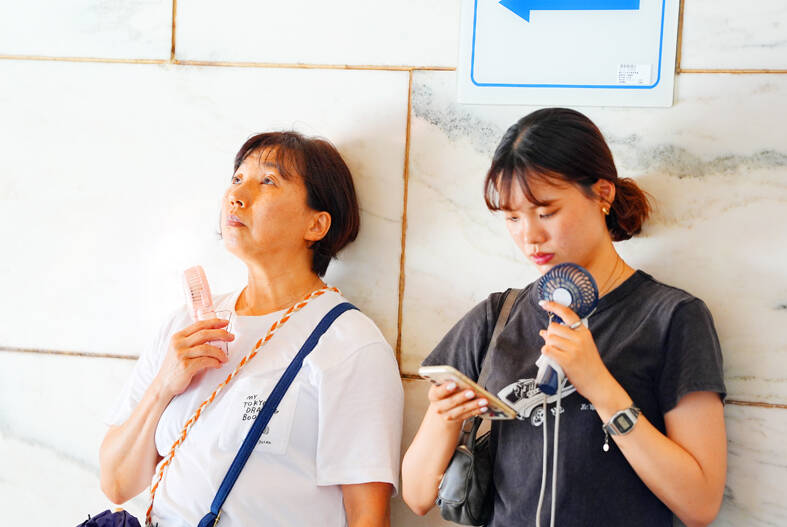Hospitals have been reporting dozens of people with heat-related illnesses every day over the past week, given continuous high daytime temperatures, so recognizing the early signs of heatstroke is crucial in preventing serious complications, a Taipei City Hospital emergency physician said.
The Central Weather Administration yesterday issued a heat alert for 19 cities and counties across Taiwan, with temperatures in New Taipei City, Miaoli County and Pingtung County likely to exceed 38°C, and temperatures in 12 cities and counties likely to exceed 36°C for three days straight.
More than a dozen people were taken to hospitals for heat-related illnesses every day from July 2 to Thursday — with the daily number reported by hospitals ranging from 25 to 55 per day, data released by the Ministry of Health and Welfare on Friday showed.

Photo: CNA
Heatstroke is a serious, heat-related illness that occurs when the body is unable to control its rising temperature and can be life-threatening, said Chung Ping-yen (鍾稟彥), an emergency physician at Taipei City Hospital’s Heping Branch.
Climate change has brought about more frequent extreme heat events, so understanding the risk of heatstroke, taking preventive measures, recognizing the symptoms and knowing the immediate proper treatment are becoming ever more important, he said.
Heatstroke is mainly caused by exposure to hot (35°C or higher) and humid weather for prolonged periods, as it is more difficult for sweat to evaporate off the skin and cool the body down, Chung said.
Other physiological factors, such as age and health, and exposure factors, including occupation and the medicines one is taking, might also affect an individual’s vulnerability to heat, he added.
Elderly people, young children, people with underlying health conditions or who are taking certain drugs, and people who need to work or exercise outdoors for long hours have an increased risk of heat stroke, he said.
“Recognizing the symptoms of heat stroke is important,” Chung said, adding that early symptoms include dizziness, a headache, nausea, a fast heartbeat, fast breathing or shortness of breath, and red, hot and dry skin.
If left untreated, the symptoms can worsen rapidly, and high fever (more than 40°C), confusion, seizures and loss of consciousness can occur, he said.
“It’s worth noting that a difference between heatstroke and heat exhaustion is that usually a person suffering a heatstroke has dry skin with no sweat, because their body’s heat-regulating mechanism has completely failed,” Chung said.
If a person is suspected to be having a heatstroke, other people should move them to a cool and shady area, remove their excess clothing and, if possible, put them in a cool shower, or place ice bags or cool wet towels over their body to help them cool down quickly, he said.
If the person is still conscious, they can be given water or sports drinks, but must avoid drinking too much water, he added.
In the case of severe heatstroke symptoms or unconsciousness, people must call for emergency medical help, and continue to monitor the person’s body temperature and consciousness while waiting for assistance, Chung said.
To prevent heatstroke, people should avoid going outside during the hottest hours (usually around noon to 3pm), Chung said, adding that if they must go outdoors in the heat, they should drink water every 15 to 20 minutes, even if they do not feel thirsty, and wear loose, lightly colored and breathable clothing.
Air-conditioning or fans can be used indoors to cool down, while those who need to work in high temperature environments should rest more often, Chung said.

Taiwanese scientists have engineered plants that can capture about 50 percent more carbon dioxide and produce more than twice as many seeds as unmodified plants, a breakthrough they hope could one day help mitigate global warming and grow more food staples such as rice. If applied to major food crops, the new system could cut carbon emissions and raise yields “without additional equipment or labor costs,” Academia Sinica researcher and lead author the study Lu Kuan-jen (呂冠箴) said. Academia Sinica president James Liao (廖俊智) said that as humans emit 9.6 billion tonnes of carbon dioxide compared with the 220 billion tonnes absorbed

The Taipei Mass Rapid Transit (MRT) Wanda-Zhonghe Line is 81.7 percent complete, with public opening targeted for the end of 2027, New Taipei City Mayor Hou You-yi (侯友宜) said today. Surrounding roads are to be open to the public by the end of next year, Hou said during an inspection of construction progress. The 9.5km line, featuring nine underground stations and one depot, is expected to connect Chiang Kai-shek Memorial Hall Station to Chukuang Station in New Taipei City’s Jhonghe District (中和). All 18 tunnels for the line are complete, while the main structures of the stations and depot are mostly finished, he

Taipei is to implement widespread road closures around Taipei 101 on Friday to make way for large crowds during the Double Ten National Day celebration, the Taipei Department of Transportation said. A four-minute fireworks display is to be launched from the skyscraper, along with a performance by 500 drones flying in formation above the nearby Nanshan A21 site, starting at 10pm. Vehicle restrictions would occur in phases, they said. From 5pm to 9pm, inner lanes of Songshou Road between Taipei City Hall and Taipei 101 are to be closed, with only the outer lanes remaining open. Between 9pm and 9:40pm, the section is

China’s plan to deploy a new hypersonic ballistic missile at a Chinese People’s Liberation Army Rocket Force (PLARF) base near Taiwan likely targets US airbases and ships in the western Pacific, but it would also present new threats to Taiwan, defense experts said. The New York Times — citing a US Department of Defense report from last year on China’s military power — on Monday reported in an article titled “The missiles threatening Taiwan” that China has stockpiled 3,500 missiles, 1.5 times more than four years earlier. Although it is unclear how many of those missiles were targeting Taiwan, the newspaper reported